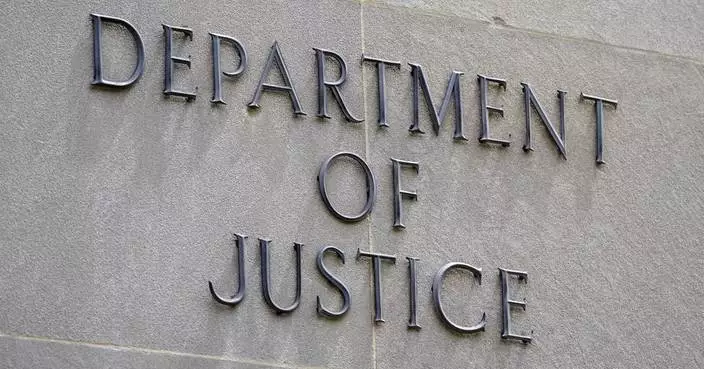The presidential primary may be decided, but election season marches on.
Voters in several states, including Maryland and West Virginia, chose nominees Tuesday in critical races that could decide the balance of power on Capitol Hill next year.
Here are some takeaways from Tuesday's primaries:
Maryland's former Republican governor, Larry Hogan, easily won his party's nomination for the U.S. Senate seat opened by Democratic Sen. Ben Cardin's retirement. The Senate race in the solidly Democratic state would normally be a snoozer, but Hogan is a candidate unlike any other Republican.
Over his two terms as governor, Hogan won a significant number of Democratic votes and remained popular among a wide swath of the left-leaning state. He's been a sharp Trump critic, which endears him to a segment of the Democratic electorate and can blunt attacks from the left. That's why Senate Republicans wooed him relentlessly to run for the newly open seat, as part of their plan to flip control of the chamber from Democrats, who currently have a two-seat majority.
Candidates with cross-party appeal like Hogan used to be a staple of national politics, but they are fading fast in an era where voters routinely vote on a straight party line rather than for individual politicians. During the last two presidential elections, only one senator — Maine Republican Susan Collins — won a state that also backed a presidential candidate of a different party.
There are recent cautionary tales of popular, moderate minority-party governors failing to win Senate seats in recent elections, evidence that voters are far more willing to vote their partisan politics for federal offices than state ones. In Montana and Tennessee, former Democratic governors Steve Bullock and Phil Bredesen, respectively, both ran for open Senate seats in deep-red states in 2020 and 2018 respectively. Both lost badly.
For the Maryland version of this, expect Democrats who previously praised Hogan's anti-Trump stances to paint him as a threat to abortion rights and entitlements because he has said he'd caucus with Republicans, which could give the GOP a Senate majority. That could make for a tough road for Hogan to win a state that Biden won by 33 percentage points.
Still, Hogan will undoubtedly shake up the Senate map and put Democrats even more on the defensive. They have to defend three seats in states that Donald Trump has won, including a newly open seat in Trump's best state, West Virginia.
Hogan will face Democrat Angela Alsobrooks, who notched a striking win in a contentious primary in which she was dramatically outspent.
If she wins in November, Alsobrooks would be the first Black senator from Maryland, which has one of the largest Black populations in the country. The lone Black woman currently in the U.S. Senate, Laphonza Butler of California, is stepping down after her appointed term ends in December. The chamber has three Black male senators.
Alsobrooks defeated Rep. David Trone, who spent more than $61 million of his own money on his Democratic primary bid for the Senate nomination. She overcame Trone’s financial advantage by winning endorsements from the state’s top Democrats, including Gov. Wes Moore, Sen. Chris Van Hollen and Rep. Steny Hoyer. She campaigned on growing economic opportunity, education and abortion rights and slammed Trone for donating to Republicans around the country, including ones who oppose abortion rights.
Trone, 68, who is white, had his share of stumbles, including using a racial slur in front of a Black witness during a committee hearing in the House of Representatives. Trone said he was trying to use a similar-sounding word.
The biggest shift in the U.S. Senate may have already happened Tuesday night, when West Virginia Gov. Jim Justice formally won the GOP nomination for the U.S. Senate seat being vacated by retiring Democratic Sen. Joe Manchin.
Manchin was a centrist Democrat who was a lightning rod for the left and the right but survived politically as his state shifted far to the right. It's likely that he was the only Democrat who could win a senate election in the state and that now Justice will replace him.
That'll swing the Senate even more in Trump's direction, regardless of whether the GOP flips additional seats to give it 50 or more senators. Trump endorsed Justice, a wealthy coal magnate-turned-Democratic politician-turned-Republican whose folksy demeanor and omnipresent English bulldog — named Babydog — endeared him to West Virginia's voters.
Like Trump, Justice has been trailed by legal controversy — his firms have been sued for not paying their debts and tax authorities have placed liens on his properties. And like Trump, Justice has strayed from GOP orthodoxy. He embraced the bipartisan infrastructure bill that Biden signed and has become a cornerstone of the incumbent president's campaign. That earned him attacks from his rival, Rep. Alex Mooney, but it wasn't enough to blunt Justice's advantages.
Justice will join a senate Republican caucus that's grown steadily Trumpier as critics of the former president have retired and been replaced by allies who win party primaries. There's no way to know how he'll vote on every issue, but in that respect, he also fits in Trump's mold.
It’s been two months since former South Carolina Gov. Nikki Haley was a candidate for the GOP presidential nomination but she keeps racking up votes from Republicans who don’t want to cast their ballot for former President Donald Trump.
Fresh off a stunning 21% tally in last week’s Indiana Republican primary, Haley received tens of thousands of votes in West Virginia and Maryland on Tuesday night. Maryland, a heavily educated, D.C.-adjacent state, is particularly tailor-made for Haley’s less ideological, technocratic approach. But even then, Haley’s strength is eye-catching.
The persistent votes for Haley could be a warning sign for Trump. Even as the Republican party coalesces around him, a chunk of its voter base still wants to vote against him. However, it’s possible many of these voters are Biden voters already who have simply chosen to vote in the GOP primary and delight in embarrassing Trump. If that’s the case, the protest vote won’t mean much in November.
Biden has been the target of his own protest campaign against his handling of the war in Gaza. Disillusioned Democrats have urged primary voters to cast ballots for “uncommitted” where the option is available. It was in Maryland, but the percentage of those votes was relatively low.
In West Virginia, Biden won handily but about a fifth of the Democratic electorate chose other candidates. That’s not unusual for an incumbent Democratic president in an ancestrally Democratic state that’s moved sharply to the right — Barack Obama only won 59% of the Democratic primary vote there in 2012, when he was running for his second term.
This story was first published on May 14, 2024. It was published again on May 15, 2024, to correct that in last week’s Indiana Republican primary Nikki Haley got 21%, not 15%, of the vote.

Laura Howard casts a ballot on Tuesday, May 14, 2024, in Waverly, Neb. (Katy Cowell/Lincoln Journal Star via AP)

FILE - Former republican Maryland Gov. Larry Hogan visits the Bridge Boat Show in Stevensville, Md., April 12, 2024. Democrats voting in Maryland's contentious primary for Senate are divided about who is best positioned to beat Hogan. Congressman David Trone and Prince George's County Executive Angela Alsobrooks are the most prominent candidates in the Democratic primary. (AP Photo/Susan Walsh, File)

West Virginia Gov. Jim Justice speaks at an election night watch party at the governor's mansion in Charleston, W.Va., on Tuesday, May 14, 2024, after he won the GOP nomination for the U.S> Senate seat being vacated by Democratic Sen. Joe Manchin . (AP Photo/Chris Jackson)










